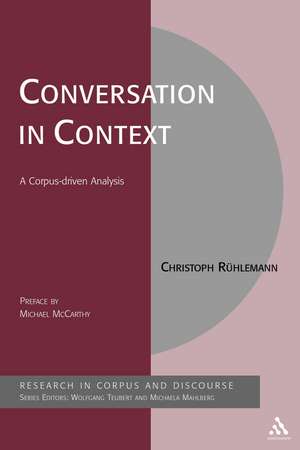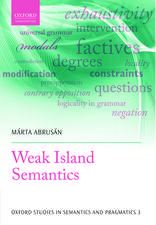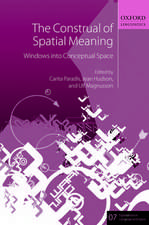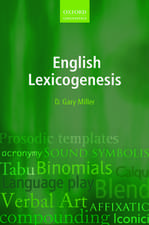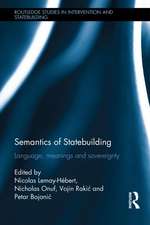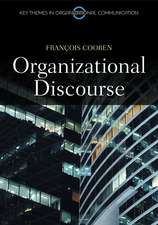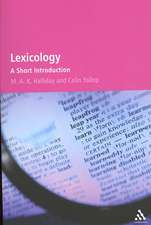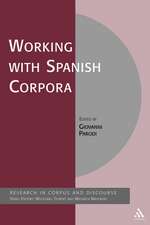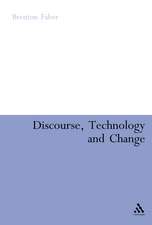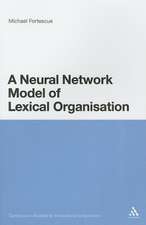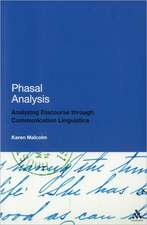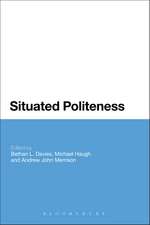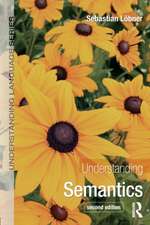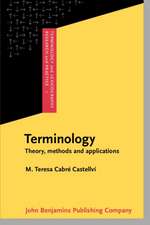Conversation in Context: A Corpus-driven Approach: Corpus and Discourse
Autor Christoph Ruehlemannen Limba Engleză Hardback – 23 oct 2007
Conversation in Context examines real-life speech data from the British National Corpus to show how language is used in natural conversation. The monograph describes the composition, annotation and transcription of the corpus, as well as providing a discussion of the methodology used in corpus analysis. The book uses a situational framework for conversation and argues that conversation is adapted to constraints set by the situation and to speaker needs arising from these constraints. Such a contextual view reveals a greater complexity to conversation construction than could have been anticipated without the use of corpus-based methods.
This book will be of interest to academics researching corpus linguistics, discourse analysis and sociolinguistics.
Din seria Corpus and Discourse
-
 Preț: 179.36 lei
Preț: 179.36 lei -
 Preț: 169.35 lei
Preț: 169.35 lei -
 Preț: 168.91 lei
Preț: 168.91 lei - 23%
 Preț: 197.86 lei
Preț: 197.86 lei - 13%
 Preț: 229.59 lei
Preț: 229.59 lei - 13%
 Preț: 257.50 lei
Preț: 257.50 lei - 22%
 Preț: 1064.84 lei
Preț: 1064.84 lei - 23%
 Preț: 199.03 lei
Preț: 199.03 lei - 18%
 Preț: 304.94 lei
Preț: 304.94 lei - 14%
 Preț: 1008.59 lei
Preț: 1008.59 lei - 13%
 Preț: 257.59 lei
Preț: 257.59 lei - 22%
 Preț: 258.24 lei
Preț: 258.24 lei - 22%
 Preț: 224.29 lei
Preț: 224.29 lei - 22%
 Preț: 258.15 lei
Preț: 258.15 lei - 21%
 Preț: 218.91 lei
Preț: 218.91 lei - 30%
 Preț: 570.76 lei
Preț: 570.76 lei - 19%
 Preț: 495.61 lei
Preț: 495.61 lei - 11%
 Preț: 375.61 lei
Preț: 375.61 lei - 8%
 Preț: 299.86 lei
Preț: 299.86 lei - 19%
 Preț: 344.75 lei
Preț: 344.75 lei - 22%
 Preț: 257.68 lei
Preț: 257.68 lei - 13%
 Preț: 257.97 lei
Preț: 257.97 lei - 22%
 Preț: 258.42 lei
Preț: 258.42 lei - 22%
 Preț: 258.77 lei
Preț: 258.77 lei - 28%
 Preț: 374.34 lei
Preț: 374.34 lei - 14%
 Preț: 570.02 lei
Preț: 570.02 lei - 30%
 Preț: 569.13 lei
Preț: 569.13 lei - 22%
 Preț: 1125.24 lei
Preț: 1125.24 lei - 14%
 Preț: 298.74 lei
Preț: 298.74 lei
Preț: 1008.01 lei
Preț vechi: 1292.13 lei
-22% Nou
Puncte Express: 1512
Preț estimativ în valută:
192.88€ • 201.92$ • 159.60£
192.88€ • 201.92$ • 159.60£
Carte tipărită la comandă
Livrare economică 05-19 aprilie
Preluare comenzi: 021 569.72.76
Specificații
ISBN-13: 9780826497130
ISBN-10: 0826497136
Pagini: 272
Dimensiuni: 156 x 234 x 22 mm
Greutate: 0.54 kg
Editura: Bloomsbury Publishing
Colecția Continuum
Seria Corpus and Discourse
Locul publicării:London, United Kingdom
ISBN-10: 0826497136
Pagini: 272
Dimensiuni: 156 x 234 x 22 mm
Greutate: 0.54 kg
Editura: Bloomsbury Publishing
Colecția Continuum
Seria Corpus and Discourse
Locul publicării:London, United Kingdom
Caracteristici
This book will appeal to a wide linguistics audience as despite being a monograph which focuses on a specific corpus of conversation, it draws broader conclusions
Cuprins
1. Background: Conversation, grammar and corpora
2. Data and methods
3. A situational framework for conversation
4. Shared-context phenomena
5. Co-construction phenomena
6. Discourse management phenomena
7. Real-time processing phenomena
8. Relation management phenomena
9. Conclusions and implications
Recenzii
"This interesting and readable book offers both detailed, focused investigations of very specific conversation phenomena (as you would expect from a revised PhD dissertation), and a comprehensive literature overview, and the beginnings of a general framework for studying conversation phenomena in general. As the subtitle "A Corpus-driven Approach" indicates, the book comes from the tradition of and is mainly aimed at corpus linguistics, but it should be of interest to anyone who studies conversation, including computational linguists, philosophers of language, sociologists, and cognitive scientists...this book offers a wealth of interesting and useful observations, analyses, references, and methodological inspirations and is to be recommended to everyone interested in (data-oriented) analysis of conversation." - David Schlangen, Linguist List, October 6, 2008
"Conversation in Context is a welcome addition to the slowly growing body of research that integrates corpus-based performance features of conversation, situation and context, and social demographics of speakers in the description of spoken discourse. Ruhlemann presents an extensive survey of recent literature and his study pursues a credible research design that is grounded on solid corpus-based traditions" Journal of Sociolinguistics, 2008
"What is beyond doubt is that the book will be of value to anyone with an interest in spoken language. Ruehlemann synthesizes a huge amount of descriptive work on spoken language in a coherent, accessible, and often engaging manner; he also gives valuable guidance to areas which have potential for further research. Personally, this book reinvigorated my long-standing interest in the teaching and description of spoken language." -- ELT Journal
"To sum up, Conversation in Context is not only another book about British conversation. Rühlemann provides a coherent theoretical framework for analysing grammatical or discoursal phenomena in conversation as shown by the variety of case studies. The empirical case studies do not only fit and strenghten the model but they represent a new way of looking at grammar and offer a new and deeper understanding of many grammatical phenomena. It remains to be seen what other features (if any) are needed to account for spoken or conversational grammar and to test these factors on the basis of more data. The book can be recommended to anyone interested in pragmatics (and sociopragmatics), discourse analysis and corpora. The book is well-written with useful and frequent to-the-point summaries. It opens up new vistas for research on grammar in conversation and other registers and is likely to have an impact on many areas in applied linguistics." -- Professor Emeritus Karin Aijmer, ICAME Journal 33
"Conversation in Context is a welcome addition to the slowly growing body of research that integrates corpus-based performance features of conversation, situation and context, and social demographics of speakers in the description of spoken discourse. Ruhlemann presents an extensive survey of recent literature and his study pursues a credible research design that is grounded on solid corpus-based traditions" Journal of Sociolinguistics, 2008
"What is beyond doubt is that the book will be of value to anyone with an interest in spoken language. Ruehlemann synthesizes a huge amount of descriptive work on spoken language in a coherent, accessible, and often engaging manner; he also gives valuable guidance to areas which have potential for further research. Personally, this book reinvigorated my long-standing interest in the teaching and description of spoken language." -- ELT Journal
"To sum up, Conversation in Context is not only another book about British conversation. Rühlemann provides a coherent theoretical framework for analysing grammatical or discoursal phenomena in conversation as shown by the variety of case studies. The empirical case studies do not only fit and strenghten the model but they represent a new way of looking at grammar and offer a new and deeper understanding of many grammatical phenomena. It remains to be seen what other features (if any) are needed to account for spoken or conversational grammar and to test these factors on the basis of more data. The book can be recommended to anyone interested in pragmatics (and sociopragmatics), discourse analysis and corpora. The book is well-written with useful and frequent to-the-point summaries. It opens up new vistas for research on grammar in conversation and other registers and is likely to have an impact on many areas in applied linguistics." -- Professor Emeritus Karin Aijmer, ICAME Journal 33
